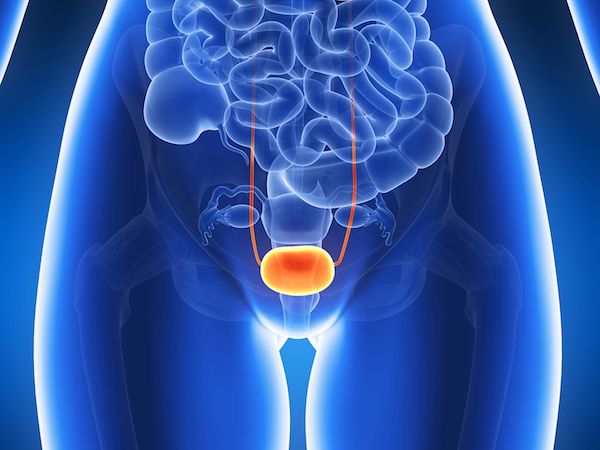Bladder cancer usually develops in the cells that line the inside of the bladder. It typically affects older adults, but can occur at any age.

Bladder cancer is more common in men and is the fifth leading cancer in South African men with the lifetime risk of developing it being 1 in 179 men, according to the National Cancer Registry.
Most bladder cancers are fortunately diagnosed early, when it is highly treatable. However, even early-stage bladder cancer can recur, so it’s recommended that survivors undergo follow-up tests to look for recurrence for years after treatment.
Bladder cancer risk factors may include:
- Smoking is said to be the greatest risk factor
- Chronic bladder inflammation
- Family history of cancer
- Bladder birth defect
- Hormonal factors
- Previous incidences of cancer
- Exposure to certain chemicals
- Age (it seldom occurs in people younger than 40)
- Being white and male (bladder cancer in men is more common, and in white men most especially)
Types of bladder cancer include:
- Epithelial cell carcinoma
- Transitional cell carcinoma
- Squamous cell carcinoma
- Adenocarcinoma
- Small cell bladder cancer
What are its symptoms?
The most common bladder cancer sign is blood in the urine (hematuria). Four out of five people with bladder cancer reportedly have some blood in their urine. Even if it comes and goes, consult your doctor immediately and give him/her as much detail as possible about your symptoms.
Other symptoms and signs of a bladder cancer include:
- Passing urine frequently
- Suddenly needing to urinate
- Inability to urinate
- Pain when passing urine
- Bladder spasm
- Back pain
- Pelvic pain
Symptoms of advanced bladder cancer may include:
- Pain
- Unexplained appetite loss
- Weight loss
If you have these symptoms you won’t necessarily have cancer. You may have a bladder infection, which is treatable with antibiotics.
Sometimes when the first symptoms of bladder cancer appear, the cancer has already spread to another part of the body. Early diagnosis is key for a positive bladder cancer prognosis.
How is it diagnosed?
Bladder cancers are usually discovered when a person consults their doctor because of certain symptoms and signs. Your doctor will give you a thorough physical examination including a bedside urine test for blood and infection, and ask you about your medical history. If he/ she suspects bladder cancer, a bladder cancer test is needed to confirm the diagnosis.
Test types include:
- Lab tests: This consists of various urine tests.
- Cystoscopy: An urologist places a cystoscopy — a narrow tube with a light and a lens or a small video camera on the end — through the opening of the urethra and into the bladder. Sterile salt water is then injected through the scope to expand the bladder and allow the doctor to look at the bladder lining.
- Bladder cancer biopsy: The removal of a tissue sample of tissue to see if it is cancerous.
- Imaging tests: These use X-rays, magnetic fields, sound waves, or radioactive substances to create pictures of the inside of your body.
If bladder cancer is confirmed, your doctor may advise additional tests to determine the stage or extent of the cancer.
Stages of bladder cancer range from I to IV, becoming more severe and invasive as it progresses. By stage IV, the cancer cells may have spread to the lymph nodes and other organs, such as your lungs, bones or liver.
What are your treatment options?
Once diagnosed, you will be assigned a multidisciplinary healthcare team, which will guide you through your cancer treatment and outline your options.
Bladder cancer treatments depend on the type and how advanced the cancer is, as well as your overall health and treatment preferences.
The main types of treatment for bladder cancer are:
- Surgery: This may include surgery to remove a tumour, a portion of your bladder or an entire bladder removal.
- Biological therapy (immunotherapy): This works by signalling your body’s immune system to help fight cancer cells. Biological therapy for bladder cancer is administered through your urethra and directly into the bladder (intravesical therapy).
- Chemotherapy: Bladder cancer drugs are used to kill cancer cells.
- Radiation therapy: Radiation therapy uses high-energy beams aimed at the cancer to destroy cancer cells.
Can it be prevented?
There is no guaranteed way to prevent bladder cancer, but there are precautions you can take that could lower your risk. These include:
- Don’t smoke: Bladder cancer from smoking is common, and reportedly causes about half the number of cases.
- Limit exposure to chemicals in the workplace.
- Drink plenty of fluids: There is some evidence that drinking a lot of fluids – mainly water – might lower a person’s risk of bladder cancer.
- Eat plenty of fruit and vegetables. Some studies have suggested that a diet high in fruits and vegetables might help protect against bladder cancer.
For more info
Cancer Association of South Africa
IMAGE CREDIT: 123rf.com
